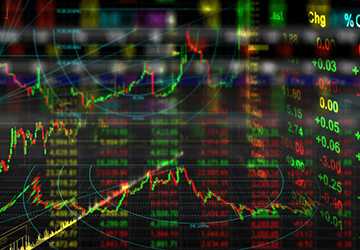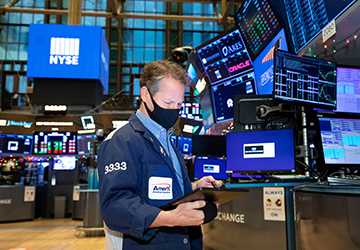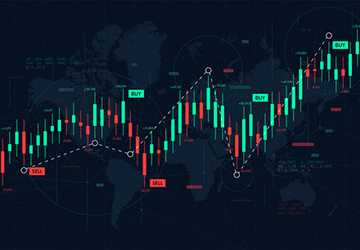The financial realm's nucleus, the stock exchange, represents a complex and expansive network. Navigators of this multifaceted domain must grasp the entities at the helm of stock exchanges and pinpoint the major players in the stock market. This discourse illuminates the influential market participants who sculpt the contours of global stock exchanges.

Exploring the Essence of Stock Exchanges
At its core, the stock exchange is pivotal in the financial ecosystem, serving as a conduit for exchanging equities, bonds, and various securities. Its critical role in fostering economic growth cannot be overstated, as it offers corporations a platform to amass capital while providing investors a share of ownership in these entities. A deep dive into the forces at play, including who controls the stock exchange, is crucial for stakeholders in the financial markets.
Dissecting the Anatomy of Stock Exchanges
One must first dissect its anatomy to demystify who controls the stock exchange. Stock exchanges can be tangible trading arenas or virtual platforms where securities transactions occur. They are under the watchful eye of regulatory and autonomous bodies, which ensure ethical trading practices prevail.
Titans of the Stock Market
The major players in the stock market encompass a spectrum of actors, each with a distinct role within the ecosystem:
● Regulatory Authorities: These overseers control the stock exchange, instilling transparency and fairness. The United States Securities and Exchange Commission (SEC) is a quintessential example.
● Brokerage Entities: These intermediaries bridge the gap between buyers and sellers, smoothing the path for transactions within the stock market.
● Institutional Investors: This cadre, which includes pension funds, mutual funds, and insurance entities, injects substantial capital into the market.
● Retail Investors: These individual entities purchase shares, bonds, and other securities, enhancing market liquidity.
● Liquidity Providers are firms that consistently offer to purchase and sell specific stocks at publicly quoted prices, ensuring continuous market fluidity.
● Monetary Authorities: Central banks, wielding substantial authority over economic policy, indirectly shape stock market dynamics through interest rate adjustments and financial stability measures.
● Credit Assessment Agencies: Credit rating agencies meticulously assess the fiscal robustness of corporations and governments, exerting influence over investor sentiment and market gyrations with their evaluations.
● Sophisticated Investment Funds: Hedge funds employ multifaceted trading strategies, frequently influencing market sentiment with their extensive, speculative investments in diverse financial instruments.
● Investment Consortiums: Private equity firms deploy capital in enterprises, often facilitating their privatization or restructuring, potentially yielding significant ramifications on market valuations and investment patterns.
● Visionary Investors: Venture capitalists catalyze innovation by funding startups and nascent enterprises, potentially precipitating substantial market repercussions upon their public debut.
● Providers of Exchange-Traded Funds: ETF providers furnish diversified investment avenues, enabling investors to partake in a broad portfolio of assets and exert influence over sector-specific market trajectories.
Sovereignty Over the Stock Exchange
Delving into who controls the stock exchange unveils a complex governance structure. Regulatory bodies wield significant influence, safeguarding investor interests and ensuring market integrity. Conversely, the exchanges' operational and governance frameworks are typically managed by the exchanges themselves, whether public or privately held institutions.
Pillars of Influence in the Market
Influential market participants such as institutional investors have the clout to sway market directions significantly through their voluminous investments. Likewise, liquidity providers play a pivotal role in facilitating seamless buying and selling of securities.
Navigating New Trends and Obstacles
Emerging trends and challenges, including the ascendancy of sustainable investing and the repercussions of geopolitical events on market volatility, mark the stock market's ever-evolving landscape. A profound understanding of the major players and who controls the stock exchange is indispensable for adeptly navigating these shifts.
Worldwide Impact and Collaborative Ventures
Within the vast expanse of international finance, the interconnectedness of diverse stock exchanges illuminates the critical role of collaborative ventures and strategic partnerships. Such alliances magnify opportunities for global trading, bolster financial market steadiness, and smooth the path for investments that transcend national boundaries. The complexity of these partnerships accentuates the sophisticated influence of influential market participants in sculpting the trajectory of global market tendencies.
Technological Paradigm Shifts in the Stock Market
The advent of technology has revolutionized the stock market, introducing electronic trading platforms that expedite and streamline transactions. This technological leap has led to algorithmic trading, where computers execute trades based on pre-set criteria, further influencing market trajectories.

Revolutionary Technological Advancements in Market Operation
The realm of the stock market is undergoing a radical transformation courtesy of technological breakthroughs introducing state-of-the-art methodologies and infrastructures that challenge the status quo of trading operations. The introduction of blockchain technology marks the dawn of enhanced transactional security and transparency, potentially shifting the paradigms of who controls the stock exchange through a decentralized record-keeping system.
The Rise of Conscious Capital
A significant uptrend in investments driven by environmental awareness signifies a notable evolution within the financial markets. Strategies centred around ethical and sustainable investment principles are solidifying as the bedrock for influential market participants, mirroring a movement towards ventures that promise economic gains and beneficial societal outcomes.
This emerging direction emphasizes the transformation in evaluating investment opportunities, spotlighting the ascendancy of environmental, social, and governance (ESG) considerations in financial decision-making.
The Progression of Regulatory Frameworks and Market Integrity
With the continuous advancement of the global financial landscape comes the evolution of regulatory oversight, which is designed to safeguard market integrity, protect the investment community, and thwart economic wrongdoing.
Such advancements in regulation redefine who controls the stock exchange as oversight agencies adjust to contemporary challenges. Grasping these regulatory transitions is imperative for major players in the stock market to manoeuvre through the complexities of today's financial regulations adeptly.
Conclusion
The major players in the stock market, from regulatory watchdogs to brokerage houses, institutional and retail investors, and liquidity providers, are integral to the stock exchanges' operations. Comprehending who controls the stock exchange and acknowledging the influential market participants is crucial for anyone aspiring to master the complexities of the financial markets. As technological advancements and global developments continue to reshape the market landscape, staying abreast of these critical actors will prove essential for stock market success.



